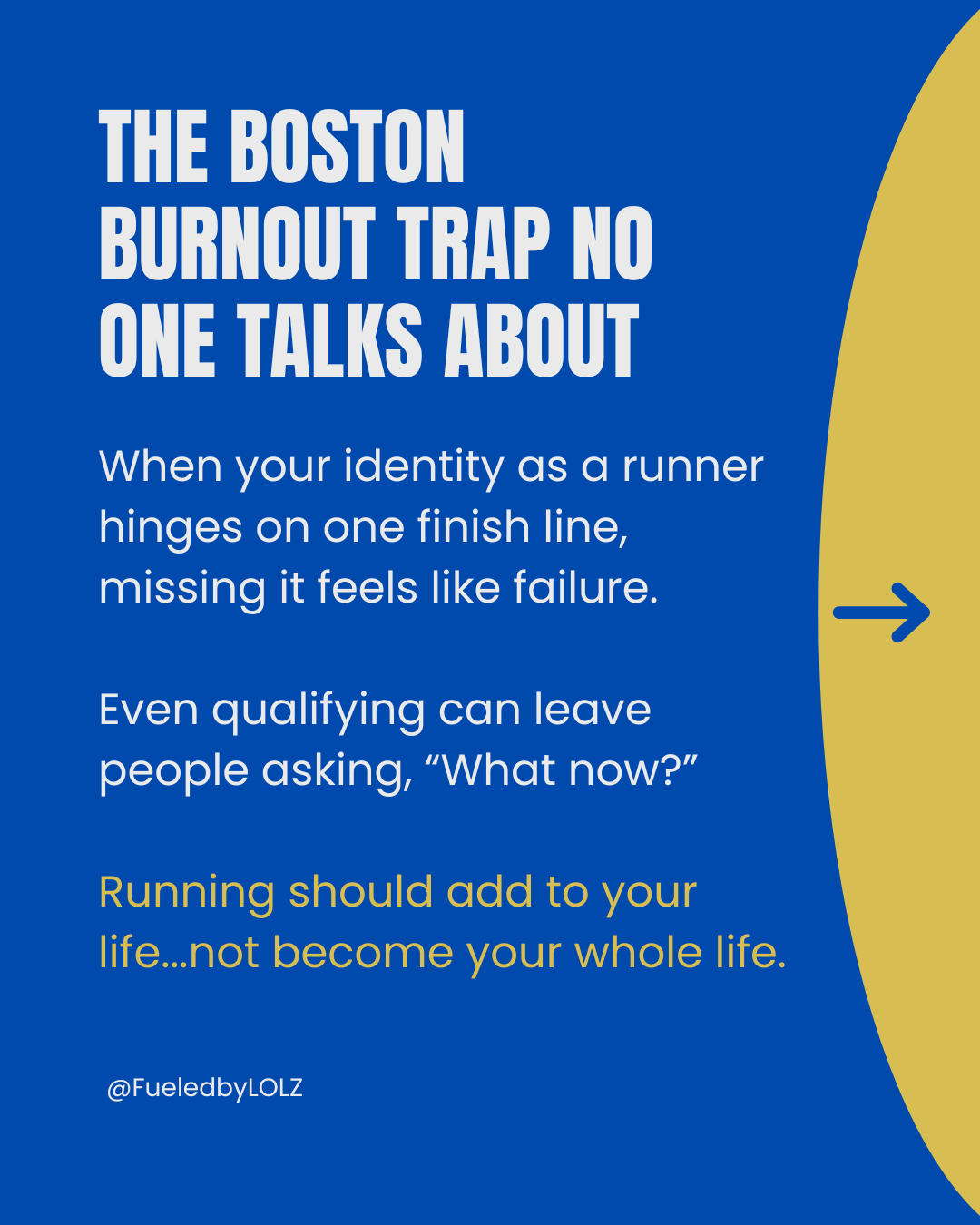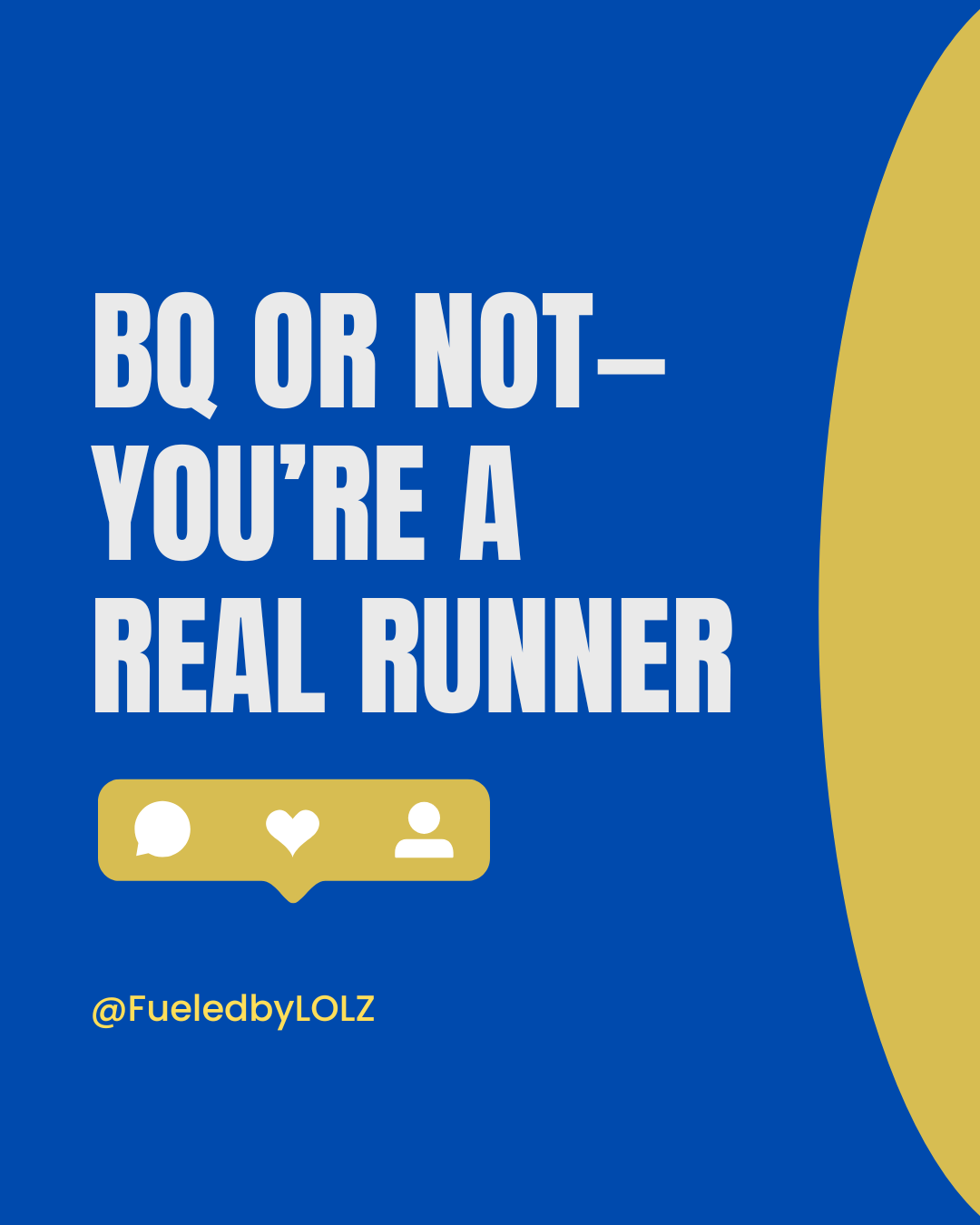LOLZLetter 330 | The Boston Qualifier Obsession Is Ruining the Sport
Welcome,
It’s funny...I started writing this newsletter about two weeks ago. Then I felt inspired to write about burnout, so I left this one in drafts. And just as I was circling back, the B.A.A. announced new rules for qualifying using downhill marathons. Now that people have had time to digest the news, it feels like the right moment to talk about what’s really behind all this.
The Boston Qualifier obsession.
You know the one. It’s plastered on Instagram, printed on t-shirts, baked into Strava captions. “Chasing the BQ.” “BQ or bust.” “Finally earned my unicorn.” But also, doesn't it seem like every runner that you know (including me) has an opinion on BQs and the Boston Marathon?
And before we go further: I respect Boston. It’s iconic, it has history, and qualifying is a huge achievement.
But the relentless fixation on the BQ as the ultimate sign of running success? That’s where things get messy.
How the Boston Qualifier Became the Holy Grail
Boston used to be a bucket list race. Now, it’s the bucket list race. The qualifying times are tough enough to prove you’re fast...but not too fast. You don't have to be an Olympian to run Boston. That sweet spot makes them perfect social media currency.
Cue the hashtags. Cue the runners building their entire self-worth around “becoming a BQ-er.”
It makes sense...we love tangible goals and validation. And in a world where race times are public, we love comparison (even when we know it’s toxic).
But when this one narrative dominates, it skews what running is supposed to be about.
The Elitism Problem in Boston Marathon Culture
One of the most frustrating parts of the BQ obsession is how it creates a hierarchy within the running world.
I’ve seen it at races, on social media, and even at Boston itself. There’s this unspoken divide: “real” runners chase Boston. Everyone else? Just doing it for fun. This isn't too say everyone does this, but enough do that it's noticeable.
It's ridiculous. Finishing a marathon you trained for requires grit...no matter the pace. A BQ doesn’t make you more legitimate than someone who isn’t chasing it.
And yet, when the only stories that get celebrated are “How I finally qualified,” it sends a message: If you’re not pursuing this, you’re not serious. If you can’t hit those times, you’re lesser.
I’ve heard runners say they feel invisible because they’re not close to BQ pace. Others feel embarrassed posting their finish times, knowing it won’t get as many likes or “congrats.”
The beauty of running is that it should be for everyone. We shouldn’t be turning it into a status symbol.
The Burnout Trap of Chasing a BQ
I’ve lost count of how many friends have poured everything into chasing a BQ...only to come up short and feel completely crushed. Not just disappointed...crushed.
When your entire identity as a runner is tied to one finish line, missing it feels like failure. Even hitting it can be disorienting. I’ve seen people qualify, celebrate and then flounder. They didn’t know what came next because the BQ had become everything.
Running should add to your life, not take over. When the goal becomes the whole point, the joy disappears. Almost no one's life depends on how fast they run. It's supposed to be fun.
There Are Other Running Goals That Matter
There are so many reasons to run, and none of them require Boston.
Want to finish your first marathon? Amazing.
Want to PR in the 5K? Go get it. It’s fast girl summer.
Want to run because it helps your mental health? Beautiful.
Want to complete an epic trail race? YES!
None of these goals are lesser just because they don’t point to Boylston Street.
We need more of these stories in our running spaces. More variety in what gets celebrated. Follow people who are doing different things...different paces, different races, different everything.
If a BQ Lights You Up...Go For It
For some, chasing a BQ is the perfect challenge. It’s exciting. It’s motivating. If that’s you...awesome. Go get it.
Just don’t let your goal become someone else’s measuring stick.
Boston Marathon Qualifying and Downhill Race Rules
Now let’s talk about those new B.A.A. changes.
The B.A.A.’s net-downhill indexing policy goes into effect for the 2027 Boston Marathon qualifying window (opening September 13, 2025). It’s a response to clear data showing that steep downhill marathons give runners an edge. Now, no one is saying downhill marathons aren't hard. You can't just run down a mountain with zero training and expect to BQ.
Here’s what the changes look like:
1,500–2,999 ft net downhill → +5 minutes added to your qualifying time
3,000–5,999 ft → +10 minutes added
If you've never run a race that drops more than 3,000 feet, I recommend it at least once. It’s wild how fast your legs can move. When I ran Revel Big Bear Half, I finished 10 minutes faster than my actual fitness...with very little work. Gravity helped me. That’s just the truth.
Compared to Boston or CIM, with only a few hundred feet of downhill, it’s a completely different experience.
Downhill races are hard. You still need to train. But gravity does make you faster. And the data backs that up.
Thoughts on the Change
The 10-minute adjustment for steep downhill races like Revel Big Bear or Big Cottonwood seems fair. Those races can give runners a 15–20 minute advantage in ideal conditions, so a 10-minute buffer feels like a decent middle ground without putting races out of business.
Revel races are well-run. Their appeal lies in fast courses, beautiful scenery, and great organization. Penalizing them too harshly could hurt participation and even risk business and people's livelihood. I don’t want to see races disappear or jobs lost.
This isn’t about punishing downhill races...it’s about adjusting the qualifying system to reflect reality. I wouldn’t be surprised if more races pop up with 1,200–1,400 feet of drop. Fort Collins Marathon has about 1,200. Mesa and Steamtown sit around 1,000. Honestly, I’d be shocked if Revel didn’t launch something in that range too.
The goal here is to preserve Boston’s prestige while respecting all the different ways people get there.
Conclusion
At the end of the day, running is deeply personal.
Some people want a unicorn medal.
Others want to run with their local club, chase trail adventures, or see what their body can do at any pace.
That diversity should be celebrated...not ranked. Boston is a legendary race, but it isn’t the only one that matters. So set your goals. Chase them hard. But don’t let anyone convince you that there’s only one path that counts. There are many ways to be a “real” runner, and yours is valid, too. I also encourage you to follow and share stories from people of all walks of life, training for all different things.
What is Keeping Me Entertained?
Topo Athletic Phantom 4 Shoe Review
Redeeming Anonymous Message Boards: I really enjoyed this one from Sabrina Little. Several years ago, a thread about me on online message boards led to one of my darkest depressions and I've had to force myself to stay off since.








